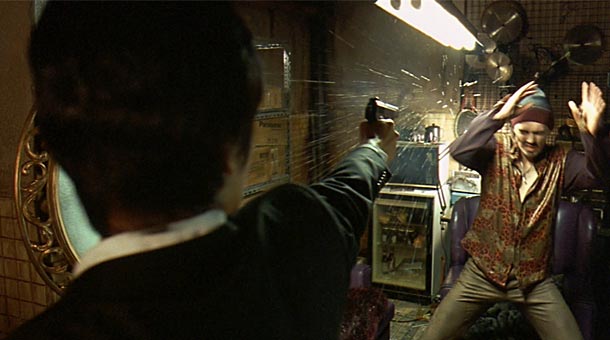
The director fails to make it an impactful impression whilst covering the important segment of the film, which is a second chance.

The director fails to make it an impactful impression whilst covering the important segment of the film, which is a second chance.
As I tracked back to the opening chapter of A Bittersweet Life, I paid attention to the wisdom that softened the silence in those few words. The film unfortunately walks about a narrower path in comparison to what I was expecting it to be. It unfolds itself in a rather lazy manner to which it proves its true deliverance towards Japanese/S. Korean cinema.
A Bittersweet Life doesn’t make the standard gangster film – but this may not necessarily be a hot topic of attention for most remembered classics in the near future. You need to either play by the rules or make sure you leave an impression once the movie comes to an end. I’m not quite sure I was entirely content with its overall performance, but I’d highly recommend a watch at least.
Since the title of the film gives it away, the story must revolve around a life of a single character or an industry as a whole, right? Well, in order to successfully deliver, director, Jee-woon Kim fails to place the audience’s central focus of attention on Sun-woo. He’s designed to appear as a regular working class business man in his mid-thirties, having a rather mundane way of life. He lives around a bitter shell that defines him of his industry that he belongs to, yet soothing and placid on the inside, trying to live a life that he can never have. To me, it takes one of the longest times for the audience to get that real firm grip of the lead protagonist. The director’s effort to form a kind of attachment is moulded around by thick layers of, well… as odd as it may sound, “Time”. Yes, time plays a major constraint, especially by the way in which it holds the storyline and characters tight. I thought it was a waste of frames and effort trying to come to the second half of the film. It wasn’t that I preferred the action sequences over the long initial 60 minutes of drama; I just thought that the film could have spun gladly on a slightly shorter reel.
The film’s background score does most of the talking, depicting the precise flavours for various moods. The film would be hanging empty without the simple strokes of the violin bow trickling and finding its way into the shallow gaps of our minds. With the vivid description, I can only say that Dalparan brings out an exceptional addition to the cast and crew. With the tune, so loud and fresh in my conscious, this was one department in which I can find no complaints whatsoever.

As funny as this may sound, the film turns around and travels upon an open and a broader route. It was about time that this transformation was to take place. It didn’t seem gradual, progressive or measured but much rather thrown into the open, almost as if it had all the liberty to attempt over any kind of possibility. I only felt this way because I was genuinely unhappy with the pace of the film, as I’ve mentioned earlier, which is why the blatant observation pointed across. It was like a tale of two halves, in which most of which was dominated successfully by quicker cuts, the fair remark of revenge and the violence that labels the later 90 minutes. One by one, Sun-woo eliminates every member that comes in his way – it’s nothing new to see in cinema these days, but at least finds a way to break the ice, which to me is the primary concern.
It’s pleasing to see how the film doesn’t carry the weightage of the wrong elements by the end of it. Even as obvious as it may have seen, anyone could have seen the softer corner of Sun-woo. The director fails to make it an impactful impression whilst covering the important segment of the film, which is a second chance. It wasn’t all that clear to me at first, but it made sense at the end of it all. Was the film all about a second chance after all? The ending is all about assumption and speculation, which is why I wouldn’t go 10 ways into it, but I would personally like to think that writer, Jee-woon Kim, tries to implement his wisdom into this non-linear theme. Observe how Sun-woo believes that Heesoo deserves an opportunity to live her life than die. His character, moulded by morals and principles is what differentiates him from every other badass gangster in the industry. Fate and karma together, bring him a chance to rise from the dead as well; revenge being the final (and only) option. His belief and fantasy of the world that he lives in, to the contrast in the reality that is what differentiates the “bitter” & “sweet” paths of his consciousness.
A Bittersweet Life is a semi-clichéd action film. Even though movie ends up showing you more than you could have visualized in the very beginning, it is probable that it loses the knockout punch at the very end. To summarize, it is only a fair and respectable understanding of what was put across. I would have the film worked on various departments, had I the chance of a remake. It is a bag full of ingredients, but not balanced in the perfect of orders.